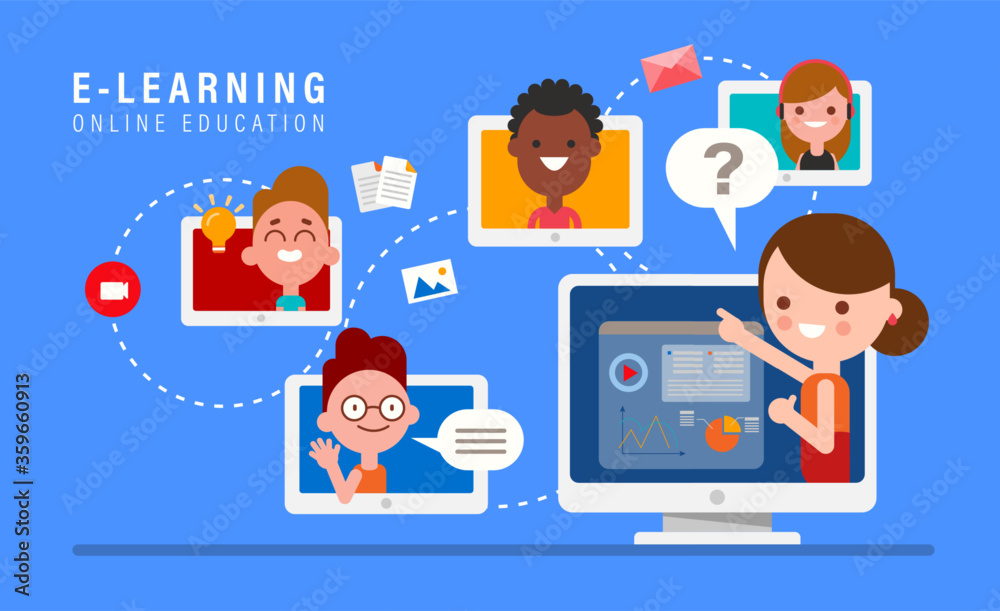Tips for Effective Education and Study for Children and Kids at Home
Tips for Effective Education and Study for Children and Kids at Home
Blog Article
Discovering the Value of E-Learning for Kids in the Modern Educational Landscape
In today's quickly developing instructional landscape, the importance of e-learning for youngsters can not be overemphasized. E-learning systems supply unmatched access and versatility, providing to diverse learning designs while fostering important electronic literacy abilities. These systems integrate interactive aspects that boost engagement and promote crucial thinking, preparing students for future challenges. As we think about the transformative impact of modern technology on education, it is essential to explore how e-learning can further improve learning outcomes and collaboration amongst young students. What specific benefits does e-learning offer that standard techniques may not, and exactly how can these be optimized for optimal academic growth?
Advantages of E-Learning
E-learning provides various benefits for youngsters, changing the method they obtain knowledge and skills. E-learning platforms enable children to gain access to academic material from practically anywhere, breaking geographic barriers and helping with continual understanding.

Moreover, e-learning cultivates technical proficiency. As children browse electronic platforms, they obtain essential computer system abilities and come to be proficient at making use of different software application and devices, which are crucial in today's digital age. In addition, e-learning can incorporate interactive aspects such as games, tests, and video clips, making the learning experience more engaging and pleasurable.
Additionally, e-learning supports diverse discovering demands with personalized material, dealing with individual preferences and promoting inclusivity. In amount, e-learning uses a versatile, comprehensive, and engaging technique to modern education.
Enhancing Learning Results
Structure on the advantages highlighted, improving finding out results via e-learning is a multifaceted venture that leverages modern technology to improve instructional efficacy. E-learning platforms provide individualized learning experiences, enabling customized instructional methods that satisfy specific pupil needs. Adaptive discovering technologies assess pupil efficiency in real-time, supplying prompt feedback and adjusting the problem of tasks as necessary. This guarantees that students stay involved and tested, advertising a much deeper understanding of the material.
Moreover, e-learning helps with access to a vast selection of sources, including interactive simulations, academic games, and multimedia content. These devices can illuminate complicated concepts and make learning even more appealing, thus improving retention prices. The integration of analytics better enables teachers to track progression, recognize finding out spaces, and apply targeted treatments.
Partnership and communication are likewise significantly boosted through e-learning. Online classrooms and discussion online forums provide chances for peer interaction and cumulative analytic, which are crucial for strengthening learned ideas. Furthermore, the versatility of e-learning enables asynchronous knowing, accommodating different discovering paces and schedules.
Fostering Crucial Thinking
While improving finding out end results is a considerable benefit of e-learning, another profound influence depends on its capability to foster essential thinking among trainees. E-learning platforms usually integrate interactive tasks, simulations, and problem-solving tasks that require pupils to analyze details, assess numerous outcomes, and make reasoned choices. These tasks go beyond rote memorization, urging pupils to engage deeply with material and use their knowledge in useful situations.
Moreover, the self-paced nature of e-learning equips trainees to explore topics at their very own rate, advertising a reflective strategy to learning. This freedom enables students to examine presumptions, look for additional resources, and attract links in between different principles, thereby nurturing a way of thinking geared toward critical analysis.
Furthermore, e-learning tools commonly include collective features such as discussion online forums and group tasks, which better boost important thinking. Engaging with peers in an electronic environment calls for pupils to verbalize their thoughts clearly, think about alternative perspectives, and construct rock-solid disagreements. These communications are invaluable in developing crucial assuming skills that are necessary for academic success and future professional endeavors.
Hence, e-learning sticks out not go to this site only for its capacity to improve academic end results but also for its considerable role in developing critical, independent thinkers.
Digital Proficiency Skills
How can trainees thrive in an electronic globe without mastering electronic literacy abilities? As e-learning comes to be increasingly widespread, the necessity for trainees to develop these abilities can not be overemphasized - Education and study for children and kids.
Digital literacy enables pupils to successfully situate, review, and use information, fostering an environment for self-directed knowing. It also equips them with the ability to recognize legitimate resources from unreliable ones, a crucial skill in an age where misinformation is rampant. Moreover, by familiarizing themselves with electronic devices, students can enhance their creativity and cooperation with different on-line platforms and multimedia tasks.
Moreover, digital proficiency is inherently connected to future career readiness. Companies throughout industries seek individuals who are adept at using electronic modern technologies to resolve issues and introduce. Very early exposure to these skills through e-learning platforms positions students to be competitive in a global job market. Consequently, integrating digital literacy right into the academic curriculum is not just useful yet necessary for supporting well-rounded, future-ready people.
Future of Education
As we gaze right into the future of education, it comes to be noticeable that technological innovations will certainly play a crucial duty in shaping the discovering landscape. E-learning platforms are readied to progress, ending up being a lot more tailored and interactive, accommodating the unique requirements of each student. Fabricated Knowledge (AI) will likely go to the leading edge of this transformation, allowing adaptive learning experiences that can identify and attend to individual toughness and weak points in real-time.

On top of that, the universality of internet accessibility will promote global classrooms, damaging down geographical obstacles and advertising cross-cultural discovering experiences. This connectivity will certainly make it possible for students from diverse backgrounds to team up, fostering an extra comprehensive and inclusive academic experience.
Nevertheless, these advancements additionally demand a focus on electronic citizenship and cybersecurity. Educators and policymakers have to interact to make sure that children are outfitted with the skills to navigate this electronic globe sensibly and safely. The future of education and learning, therefore, depends upon integrating technological innovation with ethical considerations.
Conclusion
E-learning's assimilation into modern-day education and learning is important, using improved accessibility, individualized discovering experiences, and cultivating crucial thinking - Education and study for children and kids. By advertising electronic proficiency, it prepares trainees for a technology-driven future. The vibrant nature of e-learning addresses diverse finding out styles and involves trainees interactively, guaranteeing they are outfitted with needed abilities for future challenges. As innovation develops, e-learning's duty fit well-rounded, electronically experienced people comes to be increasingly significant, strengthening its relevance in modern education and learning.
E-learning systems supply individualized learning experiences, enabling for customized training methods that cater to specific student needs.While improving finding out outcomes is a substantial advantage of e-learning, an additional extensive influence exists in its capacity to foster important reasoning among trainees. As e-learning ends up being significantly common, the requirement for pupils to create these skills can not be overstated.
Very early direct exposure to these skills with e-learning platforms positions students to be competitive in you could try this out an international task market. The vibrant nature of e-learning addresses diverse learning styles and engages students interactively, guaranteeing they are furnished with required abilities for future challenges.
Report this page